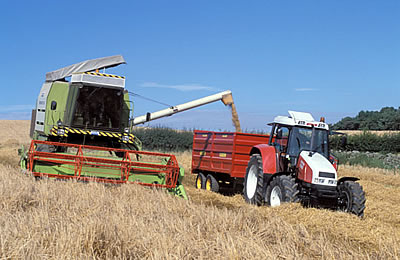 |
|||||||||
|
|||||||||||||||||||
| HSE warns North West Farmers: "Take care using transport over the summer" 11/07/05
HSE Inspectors visiting farms over the summer will look at transport issues according to the three elements of HSE's national workplace transport campaign: safe driver, safe vehicle, safe site. Drivers must be competent for the tasks they need to do. Formal training courses are widely accepted for those operating materials handlers and all-terrain vehicles (quad bikes), but few tractor drivers have received proper instruction, despite the fact that tractors are involved in most fatal incidents on farms. Also, given that more than half of those killed are self-employed, farmers should not be complacent about their own training and instruction. Vehicles must be properly maintained. As a general rule, if something is fitted on a vehicle, it should be working. This is not just a safety issue but will also prolong the life of the equipment and save farmers money. The most common causes of problems are tyre condition, brakes (including on trailers), lights and visibility (windows and mirrors). HSE is co-operating with the British Agricultural and Garden Machinery Association (BAGMA), who have produced a vehicle health check scheme. This is a useful guide to help plan and carry out an effective maintenance regime either on-farm or with a local engineer. Agricultural vehicles are not legally required to have an MOT, even if they are being driven on the public highway, but they must still be safe. The Vehicle and Operator Safety Agency (VOSA) has the power to stop vehicles on the road. If agricultural vehicles present a risk to other road users they can be prohibited from use, regardless of the inconvenience to the farmer. A number of joint initiatives are planned, for example roadside checks based on local knowledge. On the farm many transport-related injuries could be prevented simply by separating pedestrians and vehicles. It is especially important to keep children away from moving transport, as they may not understand the danger. Adopting a one-way system can be an effective control measure but this is not practical on all farms. However, it is possible to control speed, especially around yards and buildings, and to minimise the amount of reversing. Tony Mitchell, of HSE's Agriculture Safety Section, said: "Dealing with transport safety can seem quite daunting, but if you break it down into the three elements of safe driver, safe vehicle, safe site, it becomes much more manageable. Many incidents are the result of a combination of factors, so it is important to consider them all. "Every year too many people, including children, are killed in horrendous accidents involving transport on farms. Many of these tragedies could be prevented by adopting sensible management of risks; the people best placed to do that are farmers and their staff working together to improve health and safety in this critical area." HSE information can be accessed on the Internet: http://www.hse.gov.uk/ | |||||||||||||||||||

|
|
||||||||||||||||||
| home | agri-services | pedigree
pen | news | dairy | beef | machinery BPS | property | organisations | site map |
|||||||||||||||||||

